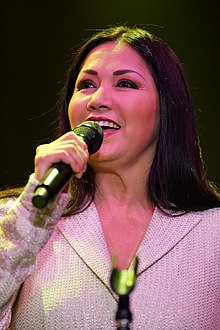List Of Number-one Billboard Top Latin Songs From The 1980s
During the 1980s, 33 songs topped the chart. According to the Billboard electronic database, the first was "La Guirnalda" by Spanish singer Rocío Dúrcal on September 6, 1986. However, in the listings included in the first printed publication of the chart on October 4, 1986, the first number-one song was "Yo No Sé Qué Me Pasó" by Mexican singer-songwriter Juan Gabriel. By the end of that year, another of Gabriel's compositions, "De Mí Enamórate", sung by Daniela Romo, also reached number one. Also in 1986, two Spanish versions of the Italian song "Tutta la vita", performed by Franco and Emmanuel succeeded one another at the top of the chart. Two songs recorded by Spanish singer Julio Iglesias peaked at number one, "Lo Mejor de Tu Vida" and "Que No Se Rompa la Noche". These songs were released from the album Un hombre solo, which received the Grammy Award for Best Latin Pop Performance.
In 1987, a biographical film about Ritchie Valens was released and American band Los Lobos were among the musicians chosen for the movie soundtrack, since the director chose to record new music for the film rather than use Valens' own recordings. They performed the title track "La Bamba", which became a worldwide success, topping the charts in the United States (including this chart and the Billboard Hot 100), Australia, France, New Zealand and Switzerland. The song "Qué Te Pasa" by Mexican singer Yuri spent 16 weeks at number one in 1988, becoming the longest-running chart topper of the 1980s, followed by fellow Mexican performer Ana Gabriel, who spent 14 weeks (in two separate runs) at the top with her single "Ay Amor".
Cuban singer-songwriter Gloria Estefan became the first artist to simultaneously peak at number one on the Billboard Hot 100 with "Don't Wanna Lose You", and the Billboard Top Latin Songs with the Spanish version titled "Si Voy a Perderte" on September 16, 1989. This single was her first release as a solo artist, independent of her role in the group Miami Sound Machine. Mexican singers Emmanuel, José José and Luis Miguel released the most number-one hits in the 1980s, with three each.
Number-one songs


- Note: A single listed more than once in the list spent a non-consecutive run at number one.
See also
Notes
- General
- "Top Latin Songs database". Billboard. Nielsen Business Media, Inc. Retrieved December 18, 2014. For information about every week of this chart, follow this link; in the chart date section select a date and the top ten positions for the week selected will appear on screen, including the number-one song, which is shown in the table above.
- Specific
- ^ "Hot Latin 50". Billboard. Vol. 98, no. 40. Nielsen Business Media, Inc. 1986-10-04. p. 71. Retrieved 2010-01-06.
- ^ "New Latin Section Created; Chart, Albums Reviews Added". Billboard. Vol. 98, no. 40. Nielsen Business Media, Inc. 1986-10-04. p. 3. Retrieved 2010-01-06.
- ^ "Top Latin Songs – La Guirnalda – Rocío Dúrcal". Billboard. Nielsen Business Media, Inc. 1986-09-06. Retrieved 2009-12-22.
- ^ "Juan Gabriel – Songs Composed By". Allmusic. Rovi Corporation. Retrieved 2009-12-22.
- ^ "Top Latin Songs – Toda la Vida – Emmanuel". Billboard. Nielsen Business Media, Inc. 1986-10-18. Retrieved 2009-12-22.
- ^ "Julio Iglesias – Charts and awards". Allmusic. Rovi Corporation. Retrieved 2009-12-22.
- ^ Bronson 2003, p. 675.
- ^ "La Bamba – Los Lobos" (in French). LesCharts.com. Retrieved 2009-12-22.
- ^ Brito, Joel (2008-07-31). "Flex invencible en Billboard Hot Latin Songs". Billboard en Español (in Spanish). Nielsen Business Media, Inc. Archived from the original on 2011-07-16. Retrieved 2009-12-22.
- ^ "Don't Wanna Lose You – Gloria Estefan". Billboard. Nielsen Business Media, Inc. 1989-09-16. Retrieved 2009-12-22.
- ^ "Si Voy a Perderte – Gloria Estefan". Billboard. Nielsen Business Media, Inc. 1989-09-16. Retrieved 2009-12-22.
- ^ Bronson 2003, p. 742.
- ^ "Emmanuel – Charts and awards". Allmusic. Rovi Corporation. Retrieved 2009-12-22.
- ^ "José José – Charts and awards". Allmusic. Rovi Corporation. Retrieved 2009-12-22.
- ^ "Luis Miguel – Charts and awards". Allmusic. Rovi Corporation. Retrieved 2009-12-22.
References
- Bronson, Fred (2003). The Billboard Book of Number 1 Hits. Billboard Books. ISBN 0-8230-7677-6.